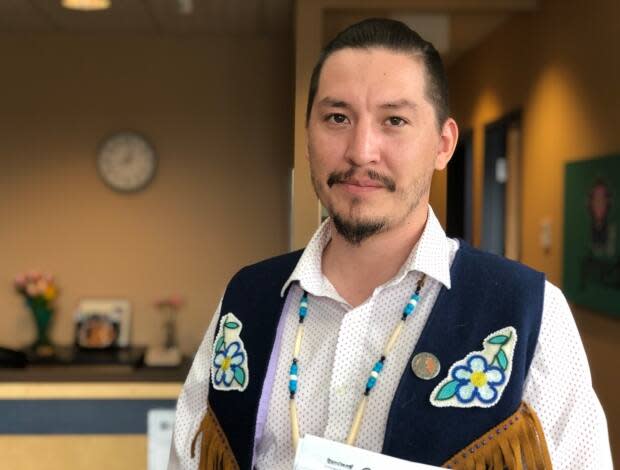Court ruling on residency requirement not 'complete win,' Vuntut Gwitchin First Nation chief says

The chief of a Yukon First Nation at the centre of a dispute over its requirement for councillors to live on settlement land says a recent court decision validating the rule is not a "complete win."
In a phone conference with reporters on July 30, Vuntut Gwitchin First Nation Chief Dana Tizya-Tramm said the Yukon Court of Appeal ruling showed that Canada was still in its "infancy … in understanding the balance in the pre-existing rights of Indigenous peoples."
It was the first time Tizya-Tramm spoke to media about the July 21 decision confirming that the self-governing First Nation had the right to require elected officials to move to settlement land within 14 days.
A Vuntut Gwitchin citizen filed a legal challenge against the requirement in 2019, claiming it was discriminatory and violated her rights under the Canadian Charter of Rights and Freedoms. The case made its way through the Yukon Supreme Court before landing in the court of appeal.
The appeal judges ruled that the requirement was subject to the Charter and violated a section protecting equality rights. However, it also found that the requirement was shielded by another section — section 25 — protecting Aboriginal and treaty rights.
It's the first time a Canadian court has examined the intersection between the individual, Charter rights of First Nations citizens, and the collective rights of Indigenous peoples.
'Hard-pressed to celebrate,' chief says
Tizya-Tramm expressed mixed feelings about the outcome.
"I would be hard-pressed to celebrate this ruling, but I will cautiously and optimistically turn to our people at the General Assembly and let them know that their voice has been heard and it has been upheld across the country," he said.
Tizya-Tramm lauded the appeal court recognizing the validity of the requirement as well as the application of section 25 as a shield that the Vuntut Gwitchin, and now other First Nations, can use to protect their forms of governance from constitutional challenges.
He also approved of the court declaring that the Charter applied to residency requirement, narrowing a Yukon Supreme Court ruling that the Charter applied to the Vuntut Gwitchin government at large.
However, Tizya-Tramm slammed the Yukon and Canadian governments for the arguments they made in court about if and how the Charter applied to the Vuntut Gwitchin government, describing Yukon's arguments in particular as "draconian."
Canada and Yukon had argued that it was clear the Charter applied to the First Nation, while the Vuntut Gwitchin government argued the Charter's application was never agreed upon during the negotiations of its final and self-government agreements.
The issue, Tizya-Tramm said, should be settled at negotiation tables, not in court.
"This largely goes to show that some of those who have the most to learn from this court case [are] Canadians and most certainly the Yukon government themselves," he said later on.
"... We will continue to have a meaningful partnership with Canada and with the premier. But that does not mean that their education in the embodiment within their institutions is yet finished."
Kris Statnyk, a Vuntut Gwitchin government lawyer and a Vuntut Gwitchin citizen himself, told reporters the First Nation's rejection of the Charter didn't make it a "jurisdictional ghetto," or indicate there was "an absence of democracy or respect for human rights or equality" in the community.
"What we were trying to demonstrate is that [even though] our system of democracy doesn't look identical to other levels of government within Canada, the federal government or territorial government, that it still is a deeply democratic society," he said.
"We have a constitution. We have [the] individual right to equality guaranteed in our own constitution. And we have ways for citizens to bring forward disputes and ... change the constitution."
Next steps to be determined at general assembly
Tizya-Tramm did not confirm whether the First Nation will be bringing the case to the Supreme Court of Canada, saying that a decision about next steps, if any, would be something for citizens to collectively decide on at the general assembly.
In the meantime, he said he looked forward to "delivering to my people that the strength of their voices have been recognised," and continuing to hold its partnerships "in a good way."
"Even though our treaty partners such as Canada and Yukon are still continuing in their journey in education ... we will embody the gentle strength of our elders and help to continue to guide them as we make this journey together," he said.

